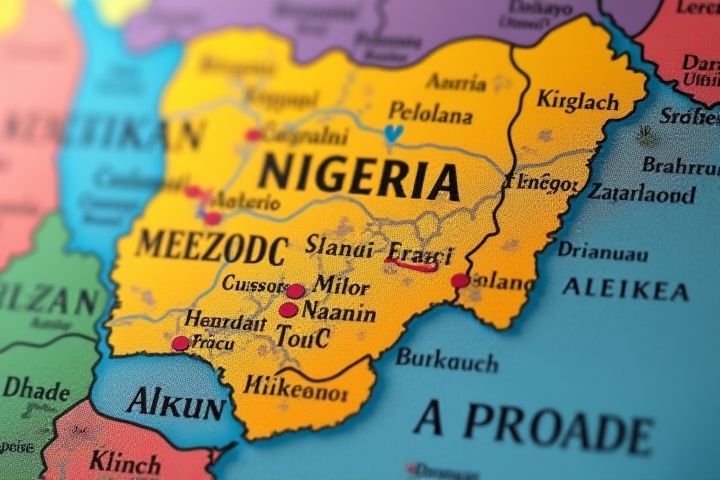
Nigeria shares its borders with four countries: to the west lies Benin, while to the north are Niger and Chad. To the east, Nigeria is bordered by Cameroon. With a coastline along the Atlantic Ocean to the south, Nigeria plays a pivotal role in regional trade and security. The diverse cultures and languages of these neighboring nations enrich the geopolitical landscape of West Africa. Understanding these borders is crucial for comprehending Nigeria's economic and social interactions within the region.
Benin
Nigeria shares its western border with Benin, a country known for its rich cultural heritage and vibrant markets. Spanning approximately 773 kilometers, this border facilitates trade and cultural exchanges between the two nations. Benin, recognized for its historical significance, is home to the former Dahomey Kingdom and the popular UNESCO-listed Royal Palaces of Abomey. As you explore this region, you will encounter a blend of ethnic diversity and unique traditions that reflect the interconnectedness of Nigeria and Benin.
Niger
Nigeria shares its northern border with Niger, a landlocked country known for its vast desert landscapes and rich cultural heritage. This 1,497-kilometer boundary allows for significant interaction between the two nations, impacting trade, security, and movement of people. Niger is characterized by the Niger River, which plays a crucial role in the livelihoods of communities near the border. Understanding this geographical relationship highlights the importance of regional cooperation in addressing challenges such as cross-border trade and security concerns.
Chad
Nigeria shares its northeastern border with Chad, a landlocked country characterized by diverse landscapes including the Sahara Desert and Lake Chad. This border spans approximately 87 kilometers and plays a crucial role in regional trade and security dynamics. Chad's capital, N'Djamena, serves as a significant economic hub, facilitating cross-border commerce between the two nations. Border security has become increasingly important due to challenges such as insurgency and smuggling, impacting both Nigerian and Chadian stability.
Cameroon
Nigeria shares its eastern border with Cameroon, spanning approximately 1,690 kilometers. This boundary runs from the northern region near Lake Chad down to the southern coastal areas near the Atlantic Ocean. Cameroon plays a significant role in the economic and cultural exchanges between the two nations, fostering trade especially in agricultural products like cocoa and palm oil. The border region is characterized by diverse landscapes, ranging from mountains to wetlands, influencing the livelihoods of the communities living alongside this international boundary.
Atlantic Ocean
Nigeria shares its borders with four countries: Benin to the west, Niger to the north, Chad to the northeast, and Cameroon to the east. Notably, Nigeria has a coastline along the Atlantic Ocean, stretching approximately 853 kilometers, which enhances its maritime trade opportunities. The Atlantic Ocean plays a crucial role in Nigeria's economy, influencing fishing industries and boosting transportation routes for exports and imports. The coastal region also features diverse ecosystems, including mangroves and lagoons, which support a rich biodiversity that is vital for sustainable development.
Lake Chad adjacency
Nigeria shares its borders with four countries: Niger to the north, Chad to the northeast, Cameroon to the southeast, and Benin to the west. Lake Chad, a vital water body in the region, is located at the intersection of Nigeria, Chad, Cameroon, and Niger, providing essential resources for millions of people. The Nigerian portion of Lake Chad is critically important for agriculture, fishing, and livestock grazing, contributing significantly to the local economy and supporting livelihoods in the surrounding areas. The geopolitical significance of this region is underscored by ongoing collaborations and challenges among these bordering nations, particularly regarding environmental changes affecting the lake.
Western border with Benin
Nigeria shares its western border with Benin, a country known for its rich cultural heritage and vibrant markets. This 773-kilometer frontier facilitates trade between the two nations, impacting the regional economy significantly. Benin's capital, Porto-Novo, is a vibrant hub of activity just across the border, while Nigeria's closest major city is Lagos, which is renowned for its bustling commerce. This proximity allows for the integration of cultures, influencing everything from cuisine to music in the border areas.
Northern border with Niger
Nigeria shares its northern border with Niger, a landlocked country known for its diverse landscapes, including the Sahara Desert and the Niger River. This lengthy border facilitates trade and cultural exchange between the two nations, significantly impacting the economies and societies on both sides. Key cities near this border, such as Diffa in Niger and Sokoto in Nigeria, serve as important hubs for commerce and communication. Natural resources and agricultural products flow across this border, establishing a vital connection that influences regional dynamics and security.
Northeastern border with Chad
Nigeria's northeastern border with Chad is characterized by the expansive Lake Chad, a vital water source that supports both fishing and agriculture in the region. This border area has experienced significant challenges, including conflicts driven by Boko Haram insurgency and intercommunal tensions, impacting socio-economic stability. The cross-border activities between Nigeria and Chad involve trade, culture, and migration, highlighting the interconnectedness of these neighboring nations. Understanding the dynamics of this border region is crucial for comprehending Nigeria's political and environmental landscape.
Eastern border with Cameroon
Nigeria shares its eastern border with Cameroon, extending approximately 1,600 kilometers. This border is characterized by diverse terrain, including rolling hills, dense forests, and numerous rivers, contributing to a rich biodiversity. The region is influenced by the socio-cultural dynamics of both countries, with various ethnic groups and trade activities flourishing along the border. Security collaboration between Nigeria and Cameroon has become crucial, particularly in addressing cross-border challenges such as illegal trafficking and insurgent movements.
